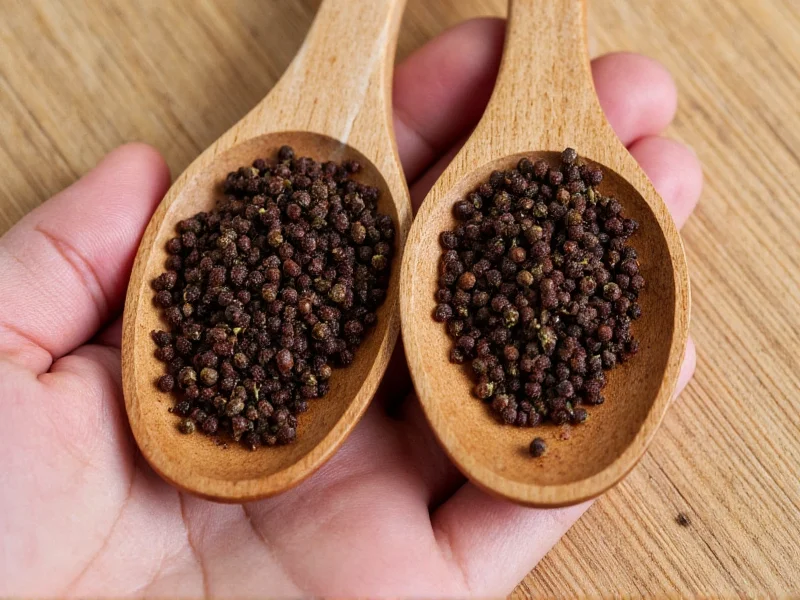When you're in the middle of cooking and realize you've run out of whole cloves, knowing how to properly substitute ground cloves can save your recipe. This common kitchen dilemma requires understanding both the conversion ratio and the flavor dynamics between these two forms of the same spice.
Understanding Clove Forms and Flavor Intensity
Whole cloves and ground cloves come from the same source—the dried flower buds of the Syzygium aromaticum tree—but their physical form creates significant differences in culinary application. Whole cloves maintain their essential oils longer, providing a more gradual release of flavor when simmered in liquids. Ground cloves, with their increased surface area, deliver a more immediate and intense flavor profile.
The potency difference is crucial for successful substitution. Ground cloves typically contain about 20-30% more concentrated flavor compounds than their whole counterparts due to oxidation during the grinding process. This explains why a direct 1:1 substitution often results in dishes that taste overwhelmingly spicy and medicinal.
Clove Substitution Conversion Guide
| Whole Cloves | Ground Cloves (Standard) | Ground Cloves (Recommended for Substitution) |
|---|---|---|
| 1 whole clove | 1/4 teaspoon | 3/16 teaspoon |
| 3 whole cloves | 3/4 teaspoon | 1/2 teaspoon |
| 6 whole cloves | 1 1/2 teaspoons | 1 teaspoon |
| 12 whole cloves | 1 tablespoon | 2 1/4 teaspoons |
Practical Substitution Techniques
When substituting ground cloves for whole in your recipes, consider these professional kitchen techniques that home cooks can easily implement:
- For simmered dishes (stews, braises, mulled beverages): Reduce the ground clove quantity by 25% from the standard conversion. Whole cloves slowly release flavor over time, while ground cloves deliver their full potency immediately.
- For baked goods (spice cakes, cookies, breads): Use the standard conversion ratio but mix the ground cloves thoroughly with dry ingredients to prevent concentrated spots of intense flavor.
- For quick-cooking recipes (sauces, glazes): Consider using only half the standard conversion, as there's minimal time for the spice to mellow during cooking.
Avoiding Common Substitution Mistakes
Many home cooks make these critical errors when substituting ground cloves for whole:
Overpowering the dish - Cloves have a strong, distinctive flavor that can dominate other ingredients when used excessively. If you accidentally add too much ground clove, balance the flavor by increasing other ingredients proportionally or adding a small amount of acid (lemon juice or vinegar) to counter the intensity.
Ignoring freshness factors - Ground cloves lose potency faster than whole cloves. If your ground cloves are older than six months, you may need to increase the quantity slightly (by about 15-20%) to achieve equivalent flavor.
Misjudging recipe timing - In recipes where whole cloves would be removed before serving (like poaching liquids or mulled wine), remember that ground cloves cannot be removed. This permanent presence requires careful measurement to prevent an unpleasantly strong finish.
Storage Recommendations for Maximum Flavor
To maintain optimal flavor when using either form of cloves:
- Store whole cloves in an airtight container away from light and heat—they'll retain peak flavor for 2-3 years
- Keep ground cloves in a dark glass container in a cool cupboard—they maintain best quality for 6-12 months
- Never store spices above the stove or near other heat sources
- Test ground cloves for freshness by rubbing a small amount between your fingers—if you can't smell a strong, sweet-spicy aroma, they've lost potency
When Substitution Isn't Recommended
While ground cloves can generally substitute for whole, certain applications work best with specific forms:
- Pickling and preserving - Whole cloves provide visual appeal and can be removed after infusion
- Ornamental uses (like studding hams or decorating oranges for potpourri) require whole cloves
- Traditional recipes where the slow release of whole cloves is integral to the dish's character











 浙公网安备
33010002000092号
浙公网安备
33010002000092号 浙B2-20120091-4
浙B2-20120091-4